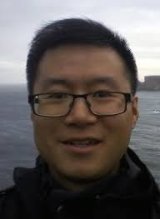Projects per year
Personal profile
Research Interests
- Environmental change, in particular long-term variability of the global climate system
- Human-environment interactions
- Sustainability
- Carbon biogeochemistry in marine and coastal environments
- Pollution history
- The origins of agriculture, languages, civilisations, and cultural conncetions
- The historical Silk Road and prehistoric proto-silk roads
- Soils: palaeopedology and pedogeography
Personal profile
Tengwen was trained as a physical geographer (2002-2006; BSc Geography) and Quaternary scientist (2006-2009; MSc Geology). He has a broad interest in Earth and environmental sciences but his research focuses primarily on the intricate interplay between humans and the environment. In this field of human-environment interactions, he employs an interdisciplinary approach that closely integrates methods and approaches in traditional disciplines such as Earth science, bioscience, and historical social sciences. His technological expertise lies in palaeoecology and geochronology.
Tengwen's research work has been published and highlighted in internationally regarded academic journals across a range of fields, including Nature Plants and Science Advances. His studies, such as the comprehensive reconstruction of the historical evolution of cannabis in Eurasia, have also garnered wide public interest and coverage in popular science publications and media platforms, including New Scientist. His active involvement in the academic community extends to serving as a reviewer for various journals across a wide spectrum of fields, such as Nature Plants, Science Advances, Marine Geology, Quaternary Science Reviews, and Archaeological and Anthropological Sciences. Additionally, Tengwen also sits as a guest editor for academic journals, a recently edited special issue being ‘Holocene Environments, Human Subsistence and Adaptation in Northern and Eastern Eurasia’ (Quaternary International).
Before joining Nottingham, Tengwen worked as a PhD researcher at Trinity College, the University of Dublin (School of Natural Sciences), and as a Postdoctoral Fellow at Freie Universität Berlin (Section Palaeontology) and German Archaeological Institute (Eurasia Department). His career is characterised by a steadfast commitment to interdisciplinary and international collaborations, where he has had the privilege of working alongside colleagues from diverse backgrounds and disciplines.
Tengwen welcomes collaboration in the broad realm of environmental sustainability and is open to discussions with motivated students regarding potential research projects, including opportunities such as internships, MRes programs, and PhD and postdoctoral projects. Please contact him for further information.
Expertise Summary
Tengwen possesses expertise in employing sediment- and simulation-based techniques to reconstruct environmental and societal changes spanning a broad range of temporal scales. His specialisation includes palaeoecological analyses, which encompass the examination of diatoms, pollen and spores, phytoliths, and charcoal remains found in sediment and soils. Additionally, GIS-based spatio-temporal modelling is a frequently adopted technique in his research.
Teaching
Tengwen has been recognised as a Fellow of the Higher Education Academy (FHEA). At Nottingham, he teaches Principles of Ecology (GEOG1022), Research Skills (GEOG1028), Techniques in Environmental Science (GEOG2050), and The Silk Road: Cultural Interactions and Perceptions (CLAR3085, INTS2037, and PHIR3035). He is the module convenor for Dissertation Preparation (GEOG2043) and Dissertation (GEOG3046).
Expertise related to UN Sustainable Development Goals
In 2015, UN member states agreed to 17 global Sustainable Development Goals (SDGs) to end poverty, protect the planet and ensure prosperity for all. This person’s work contributes towards the following SDG(s):
Disciplines
- Geography
- Geology
- Biology
- Ecology
- Archeology
- Chinese History
- Agricultural Resources and Environment
Person Types
- Staff
Fingerprint
Collaborations and top research areas from the last five years
Projects
- 1 Finished
-
Reconstructing the origin and spread of Asian rice based on Geographic Information System and Bayesian modelling
Long, T. (PI)
1/02/21 → 31/01/23
Project: Government Funded Projects › Vertical-Ningbo Municipal/Departmental Government (市厅局级) Funded Projects
-
Lady in wool and silk: 2000-year-old fashion from the Niya River oasis in the southern Tarim Basin, China
Wagner, M., Hallgren-Brekenkamp, M., Dilßner, K., Yu, Z., Li, W., Kang, X., Chen, X., Wertmann, P., Hosner, D., James, C., Sitter, E., Elkina, I. I., Long, T., Krikunova, A. I., Fahrendholz, C., Michaelis, A. C. & Tarasov, P. E., Sept 2025, In: Archaeological Research in Asia. 43, 100622.Research output: Journal Publication › Article › peer-review
-
Ecological variability and early agriculture along the Proto-Silk Roads
Long, T., 2024, Reimagining the silk roads: interactions and perceptions across Eurasia. Henderson, J., Morgan, S. L. & Salonia, M. (eds.). London: Routledge, p. 37-50Research output: Chapter in Book/Conference proceeding › Book Chapter › peer-review
-
Postglacial vegetation and climate change in the Lake Onega region of eastern Fennoscandia derived from a radiocarbon-dated pollen record
Krikunova, A. I., Savelieva, L. A., Long, T., Leipe, C., Kobe, F., Kostromina, N. A., Vasilyeva, A. V. & Tarasov, P. E., 2024, In: Quaternary International. 695, p. 31-44 14 p.Research output: Journal Publication › Article › peer-review
Open Access -
Vegetation and fire history of the Lake Baikal Region since 32 ka BP reconstructed through microcharcoal and pollen analysis of lake sediment from Cis- and Trans-Baikal
Krikunova, A. I., Kobe, F., Long, T., Leipe, C., Gliwa, J., Shchetnikov, A. A., Olschewski, P., Hoelzmann, P., Wagner, M., Bezrukova, E. V. & Tarasov, P. E., 15 Sept 2024, In: Quaternary Science Reviews. 340, 108867.Research output: Journal Publication › Article › peer-review
Open Access -
Contrasting developments of the cultural complexes south and north of Hangzhou Bay, eastern China, controlled by coastal environmental changes
Long, T., 20 Jun 2022, In: Quaternary International. 623, p. 94-100 7 p.Research output: Journal Publication › Article › peer-review
Open Access
